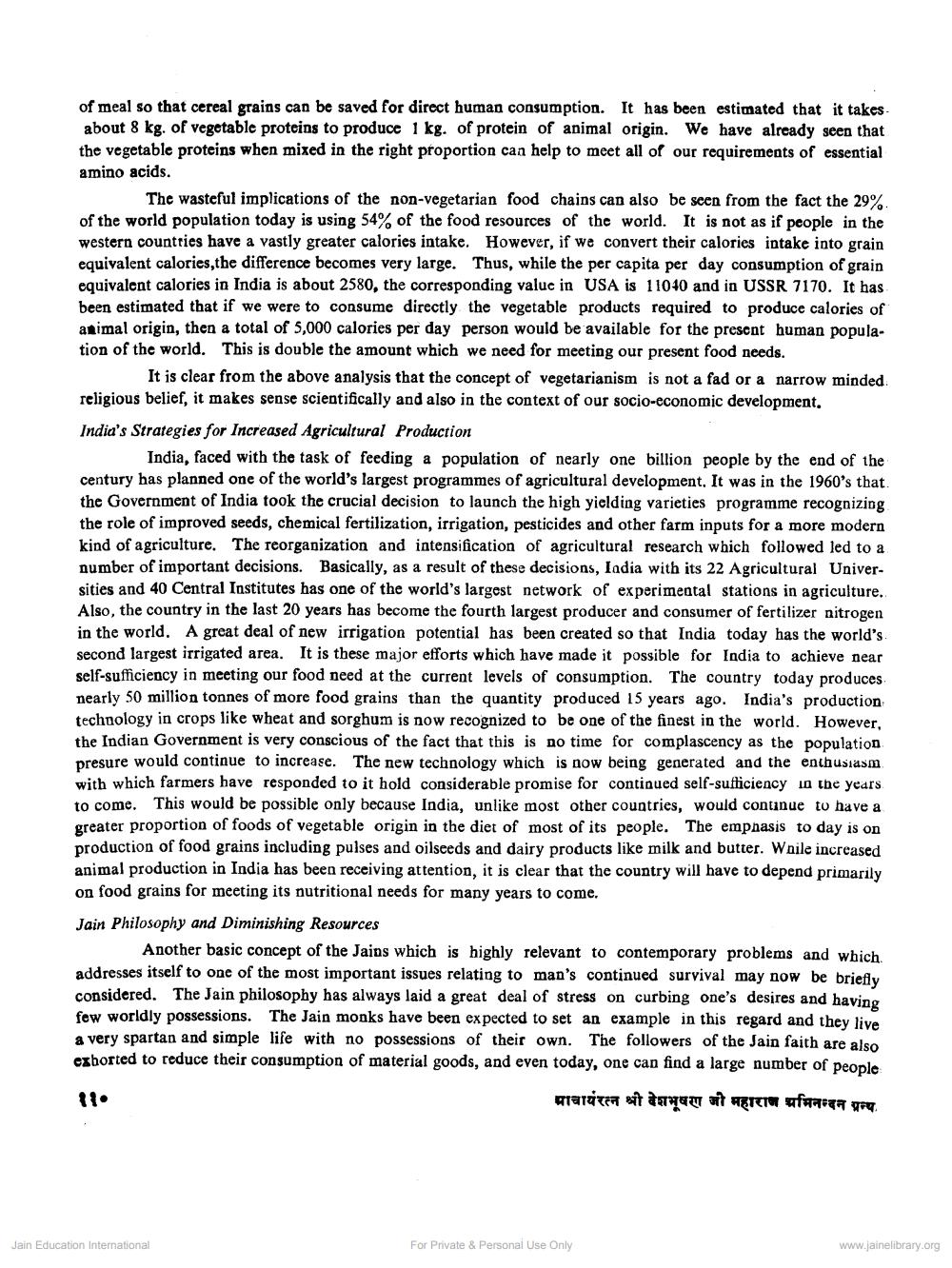Book Title: Evolution agriculture and the Jain Philosophy Author(s): H K Jain Publisher: Z_Deshbhushanji_Maharaj_Abhinandan_Granth_012045.pdf View full book textPage 3
________________ of meal so that cereal grains can be saved for direct human consumption. It has been estimated that it takes - about 8 kg. of vegetable proteins to produce 1 kg. of protein of animal origin. We have already seen that the vegetable proteins when mixed in the right proportion can help to meet all of our requirements of essential amino acids. The wasteful implications of the non-vegetarian food chains can also be seen from the fact the 29% of the world population today is using 54% of the food resources of the world. It is not as if people in the western countries have a vastly greater calories intake. However, if we convert their calories intake into grain equivalent calories, the difference becomes very large. Thus, while the per capita per day consumption of grain equivalent calories in India is about 2580, the corresponding value in USA is 11040 and in USSR 7170. It has been estimated that if we were to consume directly the vegetable products required to produce calories of animal origin, then a total of 5,000 calories per day person would be available for the present human population of the world. This is double the amount which we need for meeting our present food needs. It is clear from the above analysis that the concept of vegetarianism is not a fad or a narrow minded religious belief, it makes sense scientifically and also in the context of our socio-economic development. India's Strategies for Increased Agricultural Production India, faced with the task of feeding a population of nearly one billion people by the end of the century has planned one of the world's largest programmes of agricultural development. It was in the 1960's that. the Government of India took the crucial decision to launch the high yielding varieties programme recognizing the role of improved seeds, chemical fertilization, irrigation, pesticides and other farm inputs for a more modern kind of agriculture. The reorganization and intensification of agricultural research which followed led to a number of important decisions. Basically, as a result of these decisions, Iadia with its 22 Agricultural Universities and 40 Central Institutes has one of the world's largest network of experimental stations in agriculture. Also, the country in the last 20 years has become the fourth largest producer and consumer of fertilizer nitrogen in the world. A great deal of new irrigation potential has been created so that India today has the world's second largest irrigated area. It is these major efforts which have made it possible for India to achieve near self-sufficiency in meeting our food need at the current levels of consumption. The country today produces nearly 50 million tonnes of more food grains than the quantity produced 15 years ago. India's production technology in crops like wheat and sorghum is now recognized to be one of the finest in the world. However, the Indian Government is very conscious of the fact that this is no time for complascency as the population presure would continue to increase. The new technology which is now being generated and the enthusiasm with which farmers have responded to it hold considerable promise for continued self-sufficiency in the years to come. This would be possible only because India, unlike most other countries, would continue to have a greater proportion of foods of vegetable origin in the diet of most of its people. The emphasis to day is on production of food grains including pulses and oilseeds and dairy products like milk and butter. While increased animal production in India has been receiving attention, it is clear that the country will have to depend primarily on food grains for meeting its nutritional needs for many years to come. Jain Philosophy and Diminishing Resources Another basic concept of the Jains which is highly relevant to contemporary problems and which addresses itself to one of the most important issues relating to man's continued survival may now be briefly considered. The Jain philosophy has always laid a great deal of stress on curbing one's desires and having few worldly possessions. The Jain monks have been expected to set an example in this regard and they live a very spartan and simple life with no possessions of their own. The followers of the Jain faith are also exhorted to reduce their consumption of material goods, and even today, one can find a large number of people प्राचार्यरत्न श्री वेशभूषण जी महाराज अभिनन्दन ग्रन्य. Jain Education International For Private & Personal Use Only www.jainelibrary.orgPage Navigation
1 2 3 4
